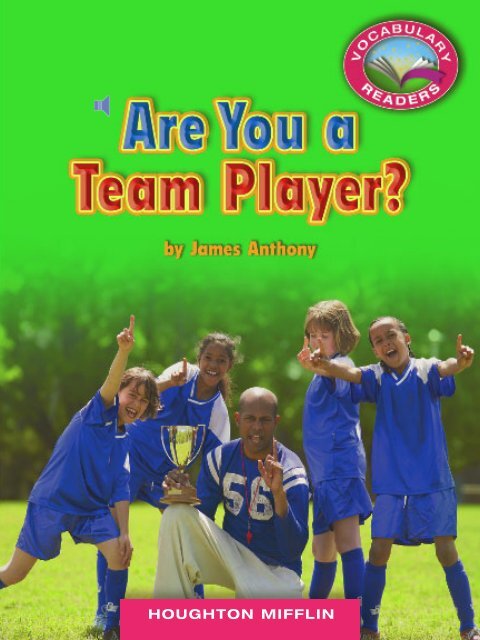Lesson 6:Are You a Team Player?
Lesson 6:Are You a Team Player?
Lesson 6:Are You a Team Player?
- No tags were found...
Create successful ePaper yourself
Turn your PDF publications into a flip-book with our unique Google optimized e-Paper software.
HOUGHTON MIFFLIN
y James AnthonyPHOTOGRAPHY CREDITS: Cover © Corbis; 1 © Tore Bergsaker / Sygma / Corbis; 2 © PhotoDisc_Sporting Goods; 3 ©Jim Cummins; 4 © Bettmann / Corbis; 5, 7, 13 (inset) © Photodisc; 6 © Jeff Kaufman; 9 © Bettmann / Corbis; 10 ©Comstock; 11 © Tore Bergsaker / Sygma / Corbis; 12 © Photodisc; 14 © Corbis; Tab © ShutterstockCopyright © by Houghton Mifflin Harcourt Publishing CompanyAll rights reserved. No part of this work may be reproduced or transmitted in any form or by any means, electronic ormechanical, including photocopying or recording, or by any information storage and retrieval system, without the priorwritten permission of the copyright owner unless such copying is expressly permitted by federal copyright law. Requestsfor permission to make copies of any part of the work should be addressed to Houghton Mifflin Harcourt School Publishers,Attn: Permissions, 6277 Sea Harbor Drive, Orlando, Florida 32887-6777.Printed in ChinaISBN-13: 978-0-547-02886-6ISBN-10: 0-547-02886-51 2 3 4 5 6 7 8 0940 18 17 16 15 14 13 12 11If you have received these materials as examination copies free of charge, Houghton Mifflin Harcourt School Publishersretains title to the materials and they may not be resold. Resale of examination copies is strictly prohibited.Possession of this publication in print format does not entitle users to convert this publication, or any portion of it, intoelectronic format.
Table of ContentsIndividual vs. <strong>Team</strong> Competition . . . . . . . . . . . . . . . . . . . . . . . . 3Early <strong>Team</strong> Sports . . . . . . . . . . . . . . . . . . . . . . . . . . . . . . . . . . . . 4Modern <strong>Team</strong> Sports . . . . . . . . . . . . . . . . . . . . . . . . . . . . . . . . . 6There’s No “I” in <strong>Team</strong> . . . . . . . . . . . . . . . . . . . . . . . . . . . . . . . . 8A Closer Look at Successful <strong>Team</strong>s . . . . . . . . . . . . . . . . . . . . . . 9<strong>Team</strong>work Off the Playing Field . . . . . . . . . . . . . . . . . . . . . . . 11What’s <strong>You</strong>r Score? (Quiz) . . . . . . . . . . . . . . . . . . . . . . . . . . . . 13
“A team with a star player is a good team,but a team without one is a great team.”— UnknownIndividual vs. <strong>Team</strong> CompetitionAthletic competition has been around for hundredsof years, even before the ancient Olympics in Greece.Athletes throughout history have participated in gamesand contests. Much of the time, individuals competedfor fame and glory. Who could run the fastest? Throwa ball the farthest? Jump the highest? Lift theheaviest object?The concept of teamwork is a more modern idea.Rather than competing one on one, athletes formteams and have to work asa group. Good teamworkis about making choices.<strong>Player</strong>s must choose whatis good for the group overindividual glory. <strong>Team</strong>workis not always easy, butit is essential to successboth on and off theplaying field.3
Early <strong>Team</strong> SportsIn ancient times, sports were used to teachyoung men how to become warriors. Boys competedin archery and wrestling contests. The winners weremarked as future leaders and fighters. These contestsallowed young men to prove that they had the mentaland physical skills needed for manhood — andfor battle.Native Americans also used sports to trainyoung men for combat. North American Indians playedan early form of lacrosse. The Cherokee called theirversion of the game “little brother of war.” As manyas a thousand people might have played on each side.These phenomenal games could last for three days.<strong>Player</strong>s often got hurt. But again, it was practicefor war.An early form of lacrosse4
Other early team sports were also violent.One early version of soccer in the British Isles involvedentire villages and few rules. Kicking other players wasallowed. Brute strength was valued above teamwork.For female players in the past, sports were mostlyoff-limits. They could only play noncompetitive games.This was meant to prepare them for running a homeand raising a family. The thinking then was that sportsweren’t for girls!The Oldest <strong>Team</strong> SportThe first team sport in history was likely played bypeople who lived in ancient Mesoamerica (present-dayMexico). Two teams had between two and six players.The goal was to move a solid rubber ball past a goalline or through a hoop. The players could not touchthe ball with their hands or feet, and the ball was notallowed to touch the ground. The showdown couldmean life or death. At times, the losing players wereoffered as a sacrifice to their gods.5
Modern <strong>Team</strong> SportsIt wasn’t until the 1800s that rules for soccer,football, and baseball became official. <strong>Team</strong>s all overthe world now played by the same rules. <strong>Team</strong> sportsgrew more popularas people had morefree time. Sports pagesstarted to appearin newspapers. Fansbegan to show loyaltyto teams, rather thanto individual players.During the 1900s,the popularity of teamsports grew fast inAmerica. A “winat-all-costs”attitudecame to rule team sports.Some people worried thatplayers and fans were beingbrainwashed. Should players be taught to win at allcosts? Why were fans becoming violent if their teamlost? To many people, good sportsmanship was beingforgotten. <strong>Team</strong>work seemed not to matter now.Basketball takes teamwork.6
Today, winning is still the general goal of mostteam sports. But winning isn’t the only thing thatis important. Good sportsmanship and teamwork arenow seen as the best ways to achieve success.Many coaches today do more than teachfundamental skills of the game. They also teach theskills of being a team player. Sometimes, coachesmake teamwork their primary goal. This often resultsin the team winning more games. Plus, the playersand coaches usually have more fun.Rules of Good Sportsmanship• No cheating.• Don’t lose your temper.• Avoid negative comments of teammates,coaches, referees, and opposing players.• Don’t berate yourself or yourteammates for mistakes.• No taunting or “trash talk.”• Don’t show off or gloat.• Don’t argue with the referees’ calls.• Always congratulate the opposing team for agame well-played.7
There’s No “I” in <strong>Team</strong>So, what exactly is teamwork? And whyis it so important? Let’s look at what goes intoteamwork in the chart below.What Makes a <strong>Team</strong> <strong>Player</strong>?Reliability<strong>Team</strong> players show up for every practice.They can always be counted on.EnthusiasmGood team players truly enjoy the game, andit shows. They like to compete.Hard Work<strong>Team</strong> players work hard to improve their skills.It makes the team stronger.Respect A team player treats everyone with respect —a star player, a benchwarmer, or an opponent.SportsmanshipA true team player is a good sport. He or sheplays by the rules and behaves well.Self-SacrificeA team player does what is best for the team,even if it means giving up individual glory.8
A Closer Look at Successful <strong>Team</strong>sDefining team success can be a bit tricky.Does a team have to win every game to be consideredsuccessful? Does how well a team works togethermake it a success? Read about two sports teamsfrom U.S. history and decide for yourself.The 1947 Brooklyn DodgersThe Brooklyn Dodgers had been nicknamed“Dem Bums.” This is because they lost so manybaseball games. They won onlyone World Series in theirlong history.In 1947, the Dodgers lostthe World Series. Yet, the 1947Dodgers might be the mostimportant team in U.S.sports history. They were thefirst Major League team withan African American player.He was Jackie Robinson.Baseball has been calledAmerica’s favorite sport.Before 1947, however, oldrules lingered.Jackie Robinson andthe Brooklyn Dodgers9
Rules kept African American players out ofthe Major Leagues. Many Americans thought theserules were fair. They thought that blacks and whitescouldn’t — or shouldn’t — work as a team.The heroic Robinson and the Dodgers changedthis way of thinking. They had broken the “colorbarrier” in pro baseball. They had changed history.The 1999 Women’s World Cup ChampionshipIn 1999, the Women’s World Cup championshipwas played in the United States. The U.S. women’steam was one of the favorites to win. The otherfavorite was China. The two teams met in the finals.A reserve on the U.S. team kicked the winning goal.With dramatic flair, the U.S. team had won theworld title.What could be more important than winninga world title? Perhaps it was the growth of women’ssoccer that followed. The players on the U.S. teambecame famous. They were respected for their playingskills. But they were also admired for their teamwork.The players became role models for manychildren. More girls began playingsoccer than ever before.10
The U.S. team won the 1999 Women’s World Cup.<strong>Team</strong>work Off the Playing Field<strong>Team</strong>work is important in many other areas of lifebesides sports. Teachers emphasize teamwork in theirclassrooms. Business leaders want their employees towork well together, so the company can savor success.Even a family is a team, and the parents are coaches.Working in harmony with friends, family,classmates, and co-workers can help us reach ourgoals faster. On the next page is a list of ways youcan be a good team player off the playing field.11
<strong>Team</strong>work Skills for Off the FieldCommunicateA good team member can clearly express hisor her ideas to others in a respectful way.Listen<strong>Team</strong>s need people who can understand andconsider other ideas.ParticipateGood team players are active. They do notmake other people do all the work.Solve Problems<strong>Team</strong>s almost always have problems,so members should be problem solvers.Be FlexibleStrong team members can deal with changeseasily. They don’t complain or let stress getto them.12
What’s <strong>You</strong>r Score?How do you rate as a team player? Take the quiz below.Then score your answers, using the answer key on the nextpage. (Write your answers on a separate sheet of paper.)AlwaysSometimesNever1. Do you show up for practiceon time?2. Do you practice with enthusiasmand give your best effort?3. Do you follow the rules for yourteam and sport?4. Do you volunteer to help yourteammates improve their skills?5. Do you improve your skills bypracticing them on your own?6. Do you keep a positive attitudeand encourage your teammates?7. <strong>Are</strong> you doing whatever you canto help your team reach its goals?13
Answer KeyEach time you answered “Always,” score 3 points; foreach “Sometimes,” score 2 points; for each “Never,”score 1 point.What <strong>You</strong>r Score Means19 to 21 points: Score! <strong>You</strong>’re a dependable team player!Now challenge yourself: What can I do to become an evenbetter teammate?16 to 18 points: On the Field. <strong>You</strong>’re on your way to beinga dependable team player. Now challenge yourself: Whatcan I do to help make my team even better?15 points or under: On the Sidelines. At times, you maybe a good team player, but what about those other times?Talk with a trusted adult, such as a coach, about how youcan improve.14
RespondingTARGET VOCABULARY Word BuilderShowdown is a compound word. Copy theword web below and add compound wordsthat relate to teamwork.friendship?teamwork? ?Write About ItText to Self Review the chart listing qualities ofa team player on Page 8. Then write a paragraphexplaining which quality you think is mostimportant. Use two words from the Word Builder.15
TARGET VOCABULARYberatebrainwashedflairfundamentalgloatlingeredphenomenalreservesavorshowdownTARGET STRATEGY Analyze/Evaluate Thinkcarefully about the text and form an opinion about it.Which vocabulary word tells what a tennisplayer has to do if he or she hits the ball into the net?16
Level: SDRA: 40Social StudiesStrategy:Analyze/EvaluateWord Count: 1,4936.2.6 Build VocabularyHOUGHTON MIFFLINOnline Leveled Books1033023

















